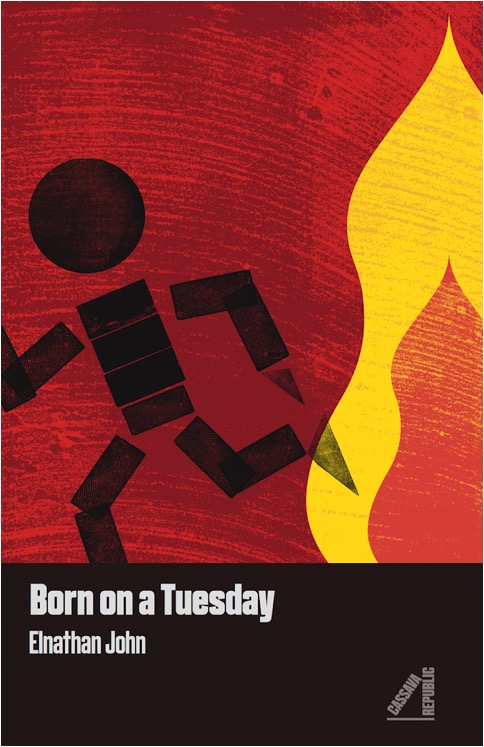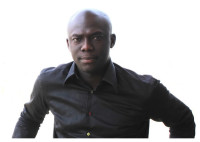You have no items in your cart. Want to get some nice things?
Go shopping

Born on a Tuesday is the debut novel of Nigerian author Elnathan John, previously a finalist for the Caine Prize for African Writing. The title translates ‘Dantala’—a Hausa word and the protagonist’s childhood nickname, lingering with him through his laborious coming-of-age. Dantala is meant to become Ahmad, to assume his real name together with adulthood. The book starts with such implied expectation, then eludes it. At the end of the story Dantala isn’t Ahmad, but Black Spirit. Yet another nickname, landed on him during the nine months of prison concluding the narrative. Only seven years have passed from page one, yet an old man—wrinkled, thin, bent, consumed—waves the reader goodbye.
How did it happen? History took off at a furious pace, carrying the boy along. Dantala grows up in the cauldron of contemporary Nigeria, tossed from a religious and political crisis to the next. Economic and natural disasters plague the population. Famine, floods, and cholera decimate the boy’s family. Taken into the whirlpool—yet coming up for air, yet with eyes wide open—Dantala doesn’t reach maturity as much as he is turned upside down, inside out, tempered like metal through fire.
After a draught impacts the family farm, Dantala is sent to Quranic school for six years. Once he is done with his training the boy lingers in town, informally enrolled by a local gang whose lieder he befriends. During elections time, the gang is bribed to make trouble on behalf of this or that party. Things turn sour. The leader is killed. Dantala manages to escape.
Trying to reach home, and the mother he hasn’t seen for eight years, the boy runs into an accident on the road. While he seeks for aid he discovers a Mosque, led by a mild, wise, enlightened Sheikh. The boy’s inquiring mind conquers the man’s sympathy. Sheik decides to make Dantala into his disciple and helper, if his family consents.
When he goes to seek his mother’s approval the boy finds home destroyed by the flood. Mom has gone insane. His estranged brothers have enrolled among the Shiites. Nothing is left for him besides joining the Mosque and take roots inside the community. Soon he befriends a youth his own age, Jivril, former Christian but recently converted. The two form a bond strengthened by a linguistic deal. Dantala teaches Jivril Arabic and learns English in exchange.
The Shiite movement creates increasing tension within the Muslim society. Violence escalates. Sheikh harbingers a tolerant, negotiating, peaceful attitude, but his main assistant—Jivril’s older brother—doesn’t agree. He creates an internal scission, then a new sect, belligerent and armed. Jivril and Dantala are separated, while Dantala’s role at Sheikh’s side grows more crucial. Yet nothing can be done to placate the hostilities, worsened by political corruption and irrational military interventions.
Though the sect created by Jivril’s brother is ultimately defeated, Sheikh is brutally killed and the Mosque destroyed. Dantala, caught as prisoner, is long tortured in order to obtain information about Jivril. He survives and is finally released, when religious and political moods further change.
If the events described are tragic, they are related without pathos. The boy lives them as a boy, coping at best, figuring how to survive them, simultaneously deciphering them and life in its whole. He goes by trial and error, asking questions, getting all the wrong answers. Or incomplete ones he will need to get back to, slowly uncovering a more credible version of shifting reality.
The tone of the narrative is stark, dry, peculiarly terse, reminiscent of classical Japanese literature. The utter lack of emotion, paradoxically, calls for powerful feelings in the end. It does is quietly, surreptitiously. Talking to himself in matter-of-fact, plain, short sentences, Dantala is so fresh, naïve and authentic, he unavoidably makes us laugh. At least smile. We relax, lower our defenses—then all the rest comes through. The style is so bared of rhetoric, so essential, it becomes lyrical. It reads like a poem, unbroken, smooth like a song.
Languages have a main role in the novel. Dantala comes from illiteracy, yet he is bright, extremely curious, capable of memorizing pages and pages in Hausa, Arabic, and English. Listening to the radio, figuring how the same events are reported in several idioms, opens up his mind and sharpens his awareness. He is thirsty for words and their meaning, dictionaries and all sort of reading.
The book’s chapters are interspersed with manuscript pages—Dantala’s notebooks, where he capitalizes difficult terms he stumbles upon, copies their definition, then, attempting to use them into sentences, mulls upon the concepts they describe. These are funny pages, full of mistakes and misunderstandings—interludes lightening the impact of too many tragedies. Yet they get to the point: understanding words, especially across several idioms, is deciphering life’s meaning across diverse credos and cultures.
Focusing on languages equates focusing on cultures—how they clash, how they could get along instead, integrate.
John’s novel is about male coming-of-age—a complex initiation, in this case fueled by reality instead than symbols and rituals. As such, and because of its Muslim setting, it’s a story about men among men. Women are excluded from the events. They exist in a separate dimension. Female presence is a polarity, pulling at the narrative from a distance. First, through Dantala’s mother, Umma. The boy loves her sincerely, misses her nurturing care, her beauty and dignity—especially her gaze showing him what is fair and right, what is mean and cruel.
Though the initial spark igniting his thirst for languages came from her (she can’t read but she’s fluent in Arabic, and she teaches her son), Umma communicates without words, thus contrasting with the byzantine, hypocritical eloquence of political and religious leaders. And she walls herself into silence when—after losing her daughters, her house and her husband—she also loses her mind. Still mute, she comes back to Dantala in dreams—a grounding, inspiring presence.
Towards the end of the book Dantala falls in love with Aisha, one of Sheikh’s daughters. The English word “obsession” helps him to define his status. “I am ‘obsess’ with Aisha,” he self-diagnoses. His passion for the girl gives him additional punch when action tightens, danger increases, things precipitate.
But his isn’t a story about love. It is a story about loyalty. About appreciating those who are truly your friends, whom you understand and feel understood by, establishing solidarity independent from ideological shifts or turns of events. Coming-of-age in Dantala’s world means summoning the courage of not betraying, choosing one’s allegiances and maintaining them no matter what. Such capacity makes a boy into a hero. Maybe a modest one—belonging to a category our society has urgent need for. An anonymous one, as indicated by the novel’s epigraph—Rumi’s poem to the unnamed stars.
Fatalism is a pillar of Muslim religion, as well as Catholic, Christian, and many other faiths. It helps bear pain, grief, and injustice—being stronger when and where these are heavier. Fatalism helps coping with violence, murder, and consequent guilt. If a person dies, however it happened, Allah had destined it. It wasn’t avoidable. Personal responsibility plays a minimal role. Dantala is born and raised in a thick fatalistic cocoon.
Yet his coming-of-age is the even-so-slight erosion of such functioning mode. Though Allah’s plans cannot be doubted or discussed, are we sure we really don’t have a say? If not free will, at least a bit of an option? Why do good people always get killed and bad ones survive? Does Allah know what he wants? Is he aware of what he is doing? Or is he as lost, as tentative as humans are? Getting to adulthood, and past, means daring to answer these questions.
Born on a Tuesday is published by Black Cat, N.Y., 2015

About Toti O'Brien
Toti O’Brien’s work has appeared in Litro NY, The Harpoon Review, Synesthesia, Aji, Adanna among many other journals and anthologies. She has contributed for a decade to various Italian magazines.





i have sent you an email